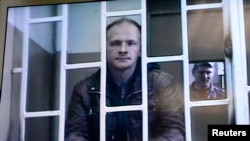MOSCOW —
Eleven Nobel Peace Prize laureates urged Russian President Vladimir Putin on Thursday to drop piracy charges against 30 people detained over a Greenpeace protest last month at an Arctic oil rig.
The piracy charges, punishable by up to 15 years' jail, appear aimed at sending a message that Moscow will not tolerate attempts to disrupt its development of the resource-rich Arctic.
Russian authorities have ordered the activists to remain in pre-trial detention until Nov. 24 and the courts have already denied bail to 16 of them. Hearings for the remaining activists are expected in the coming days.
“We are writing to ask you to do all you can to ensure that the excessive charges of piracy ... are dropped and that any charges brought are consistent with international and Russian law,” the Nobel laureates said in their open letter to Putin.
The letter, whose signatories included South African anti-apartheid campaigner Desmond Tutu, described the September 18 protest in which the activists tried to scale the Prirazlomnaya oil rig as “a peaceful, non-violent protest”.
Russian coastguards forcibly boarded the Greenpeace Arctic Sunrise icebreaker after the protest and towed it to the northern port city of Murmansk, where all aboard were arrested.
Putin has said the 30 detainees - who come from 18 countries - are not pirates, though their protest violated the law, and his human rights aide has urged the law enforcement bodies to drop the piracy charges.
A local court in Murmansk on Thursday denied bail to two more of the activists, Colin Russel of Australia and Mannes Ubels of the Netherlands.
Russia's top investigative body has said the activists may face fresh charges after it said drugs were found on the Arctic Sunrise. Greenpeace denies there were any illegal items aboard.
The Greenpeace protest targeted the Prirazlomnaya oil platform, owned by Russia's state giant Gazprom and a key element in Russia's plan to tap into the Arctic's resources.
Other signatories of Thursday's letter included American Jody Williams, who won the Nobel Peace Prize in 1997 for seeking to ban anti-personnel landmines, and Adolfo Perez Esquivel, who won in 1980 for his human rights activism in Argentina.
The piracy charges, punishable by up to 15 years' jail, appear aimed at sending a message that Moscow will not tolerate attempts to disrupt its development of the resource-rich Arctic.
Russian authorities have ordered the activists to remain in pre-trial detention until Nov. 24 and the courts have already denied bail to 16 of them. Hearings for the remaining activists are expected in the coming days.
“We are writing to ask you to do all you can to ensure that the excessive charges of piracy ... are dropped and that any charges brought are consistent with international and Russian law,” the Nobel laureates said in their open letter to Putin.
The letter, whose signatories included South African anti-apartheid campaigner Desmond Tutu, described the September 18 protest in which the activists tried to scale the Prirazlomnaya oil rig as “a peaceful, non-violent protest”.
Russian coastguards forcibly boarded the Greenpeace Arctic Sunrise icebreaker after the protest and towed it to the northern port city of Murmansk, where all aboard were arrested.
Putin has said the 30 detainees - who come from 18 countries - are not pirates, though their protest violated the law, and his human rights aide has urged the law enforcement bodies to drop the piracy charges.
A local court in Murmansk on Thursday denied bail to two more of the activists, Colin Russel of Australia and Mannes Ubels of the Netherlands.
Russia's top investigative body has said the activists may face fresh charges after it said drugs were found on the Arctic Sunrise. Greenpeace denies there were any illegal items aboard.
The Greenpeace protest targeted the Prirazlomnaya oil platform, owned by Russia's state giant Gazprom and a key element in Russia's plan to tap into the Arctic's resources.
Other signatories of Thursday's letter included American Jody Williams, who won the Nobel Peace Prize in 1997 for seeking to ban anti-personnel landmines, and Adolfo Perez Esquivel, who won in 1980 for his human rights activism in Argentina.





